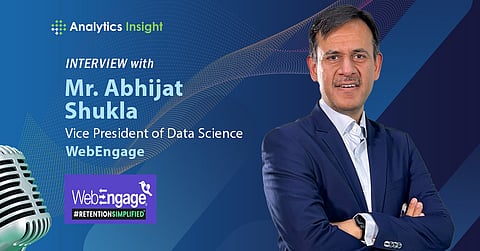

Brands today strive to deliver seamless, connected experiences across every customer touchpoint, from websites and mobile apps to physical stores and chatbots. However, without a strong data foundation, these efforts often fall short. Disconnected experiences can feel inconsistent and irrelevant, causing frustration and lost opportunities.
In the latest episode of the Analytics Insight Podcast, host Priya Dialani explores this challenge with Abhijat Shukla, Vice President of Data Science at WebEngage. With over 25 years of experience in data analytics, Abhijat shares how businesses can build stronger customer relationships. He talks about leveraging first-party data to power content strategies and unify multi-channel experiences.
Third-party cookies are now fading due to increasing privacy regulations like GDPR and India’s DPDP Act. This means first-party data has become the cornerstone of customer engagement. Abhijat describes this type of data as ‘consented, reliable, and privacy-compliant’. Hence, making it the most valuable and ethical asset for businesses.
“Brands must earn customer trust by using data responsibly,” he stresses. Unlike third-party sources, first-party data comes directly from customer interactions and behaviors. It enables brands to build accurate, real-time user profiles and craft personalized experiences.
It has become impossible to build effective AI-driven solutions without high-quality, first-party data. Abhijat comments, “The AI layer on top is only as good as the data foundation below.”
The VP explains that WebEngage is a full-stack retention operating system. It is built to help consumer brands improve user engagement and long-term retention. “The real wealth for brands lies in retention,” he says, emphasizing the shift from transactional relationships to lasting connections.
At its core, WebEngage unifies first-party data to drive powerful, contextual, and personalized communication across web, app, email, WhatsApp, and more. It enables brands to execute campaigns with precision and relevance using AI-powered segmentation, real-time behavioral tracking, and automated workflows.
Customer Data Platform (CDP): It collects and activates first-party data across channels.
Journey Designer: The module builds multi-stage, automated customer journeys.
Segmentation & Personalization Engine: AI-driven targeting based on behavior and demographics.
Analytics & Reporting: It delivers insights that drive campaign effectiveness.
Channel Integrations: This simplifies omnichannel campaign execution.
Abhijat clarifies a common misconception: multi-channel and omnichannel are not interchangeable. While multi-channel means being present across various platforms like email, SMS, and apps, it often results in fragmented experiences. “Different teams manage these channels, leading to siloed data and inconsistent messaging,” he explains.
Omnichannel marketing, however, connects all touchpoints into a seamless and unified experience. It ensures that the customer journey flows naturally across platforms, delivering timely, relevant, and contextual communication. According to Abhijat, this shift is crucial for building long-term relationships and loyalty in a highly competitive digital market.
WebEngage addresses this by centralizing all customer data, enabling intelligent, journey-based communication across platforms. These, in turn, reflect the customer's intent, behavior, and preferences in real time.
At WebEngage, Abhijat’s team uses AI and machine learning to transform first-party data into actionable insights. Their models support segmentation, churn prediction, and campaign optimization for over 800 brands across industries.
AI helps brands move from static messaging to dynamic, one-on-one engagement. It enables identity resolution, behavioral targeting, and real-time recommendations. Therefore, allowing marketers to personalize every interaction, whether on a website, app, or messaging platform.
The VP at WebEngage highlights how AI-driven insights help brands keep up with fast-changing consumer behaviors and expectations. “Consumers now expect hyper-personalization and instant relevance. Anything less feels like noise,” he remarks.
Abhijat Shukla makes a compelling case for why first-party data should be the foundation of any modern engagement strategy. With third-party cookies on the decline and privacy regulations tightening, businesses must invest in systems that collect, unify, and activate data ethically and effectively.
Listen to the full Analytics Insight Podcast to unlock the power of your brand’s data for increased customer engagement and loyalty.
